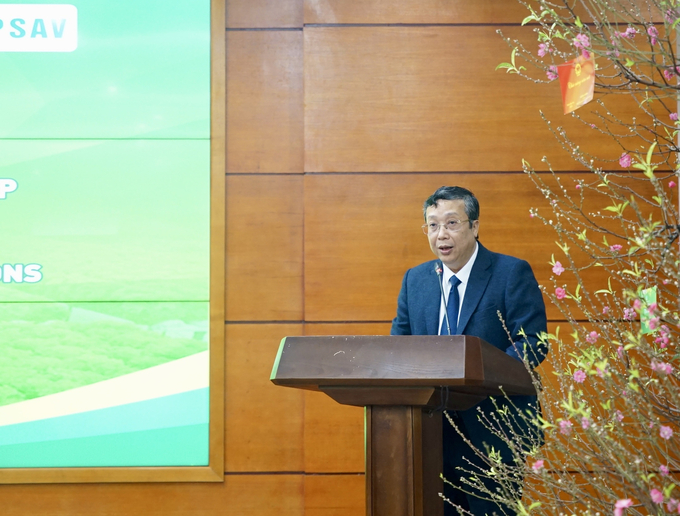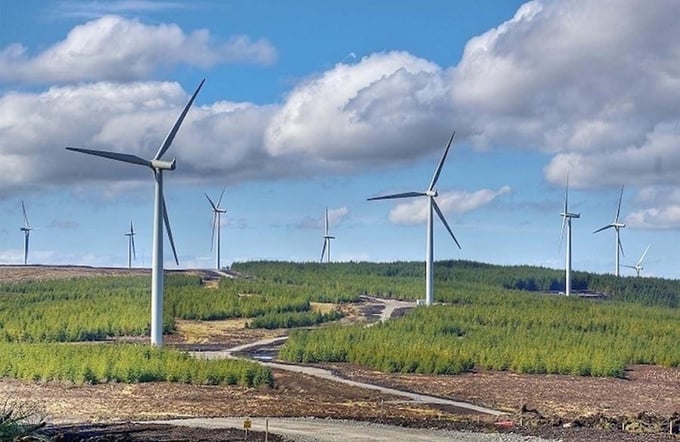May 30, 2025 | 11:02 GMT +7
May 30, 2025 | 11:02 GMT +7
Hotline: 0913.378.918
May 30, 2025 | 11:02 GMT +7
Hotline: 0913.378.918

Deputy Minister Hoang Trung delivered a speech at the comprehensive Public-Private Partnership (PPP) conference with the theme 'Businesses vis Green Transformation and Innovation in the Agriculture'.
The Ministry of Agriculture and Rural Development hosted the Plenary Meeting of Business on Green Transformation and Innovations in Agriculture on January 31, as part of the Partnership for Sustainable Agriculture in Vietnam (PSAV) framework.
As food and nutritional security face several difficulties, the food system must be reinvented to increase output and sustainability throughout the food supply chain. In which the promotion of public-private partnerships (PPP) to create green agriculture, green technologies, and added value is critical, drawing private sector investments for agricultural restructuring and transformation in accordance with the eco-friendly and sustainable route.
MARD made a Decision in December 2023 to approve the establishment of the Scheme on Food Innovation Hub Vietnam (FIHV). The implemented plan would assist to build sustainable and green agriculture, achieve economic, social, and environmental goals, and cope with climate change by connecting to the global food chain in a "transparency - responsible - sustainable" manner.
Mr. Hoang Trung, Deputy Minister of Agriculture and Rural Development and co-chair of the Partnership for Sustainable Agriculture in Vietnam (PSAV), stated that the Ministry places a high value on the role of the business community, particularly foreign-invested enterprises, in investing in Vietnam's production, processing, storage, logistics, and agribusiness.
"Businesses have an important role, particularly in agricultural production and consumption. Businesses generate jobs and revenue for farmers, develop their production abilities, and pioneer the use of scientific and technological innovations to boost productivity, quality, and efficiency. They aggressively seek and create markets, increasing the value of agricultural goods. Businesses take on a greater responsibility not just for economic progress, but also for social and environmental challenges," the Deputy Minister stated.
To efficiently execute the PPP, the MARD seeks the participation and assistance of the corporate sector, as well as domestic and foreign organizations, particularly those with innovative experience and knowledge.
Mr. Nguyen Do Anh Tuan, Head of the International Cooperation Department (MARD), informed the conference that Vietnam is one of the first three nations in the world selected by the World Economic Forum (WEF) as a pilot for the Food Innovation Hub (FIH). FIH's specific purpose is to create an innovative ecosystem for food and agriculture by bringing together local and international specialists and scientists in conjunction with businesses and government organizations to address difficulties that arise throughout the value chain.
Furthermore, the effort intends to improve the quality of Vietnamese agricultural and food goods while gradually integrating them into regional and global supply chains, with the goal of increasing the value of agricultural and aquatic product exports by 5-6% on an annual basis. As a result, by 2030, farmers' and rural companies' incomes will have increased by 2-3 times those of 2020.
According to the MARD representative, the initiative's five main innovation areas include innovative input materials, nutritious food and health, green production and processing, food quality and safety, and agricultural product marketing and logistics.

The green transformation is closely related to the environment, and carbon credits pose a significant challenge for businesses. Photo: TL.
With some open-ended suggestions, Deputy Minister Hoang Trung summarized several points on how the Ministry will work with businesses and industry association representatives to implement specific programs under the Public-Private Alliance for Sustainable Vietnam (PSAV), focusing on green transformation and emission reduction to benefit farmers.
Deputy Minister Hoang Trung requested that the International Cooperation Department gather specific viewpoints so that the Ministry may work with appropriate departments to build implementation strategies for each industry soon.
Second, the Ministry has given its approval to build the Food and Agriculture Innovation Hub. This serves as the foundation for the Ministry, enterprises, and local groups to commit to achieving the five sets of objectives. However, particular strategies for each content area are required, along with solutions connected to the aforementioned material and consistent execution by local companies.
Third, leveraging each partner's ability to mobilize resources, the Ministry invites international organizations, businesses, associations, and residents to collaborate with the Ministry and localities to implement programs aimed at green transformation and sustainable development.
Fourth, in terms of emission reduction, the Ministry will work with the Ministries of Natural Resources and Environment and Finance to establish carbon credit-specific programs. This will help individuals develop items with a low greenhouse gas emission brand and participate in the carbon credit market.
The Monitoring, Reporting, and Verification (MRV) system is critical, particularly in agriculture, which includes a 1 million ha of high-quality low-emission rice initiative. The Ministry of Agriculture and Rural Development will consult with experts to develop an effective mechanism for measuring, reporting, and verifying emissions. This contributes to the country's Nationally Determined Contributions (NDC) while selling low-emission products, increasing farmer value and income.
Finally, the Ministry is evaluating rules on input materials and new technologies in order to increase access to novel varieties, next-generation insecticides, and bio-pesticides. This will help to optimize agricultural operations, reduce production costs, increase production efficiency, and lower greenhouse gas emissions.
Translated by Dieu Linh

(VAN) Ms. Nguyen Thi Dung, Deputy Director of Ngoc Hoang Cooperative, shared about the journey of bringing dragon fruit to Europe, achieving annual revenues in the billions of VND.

(VAN) Bamboo products from Thang Tho Bamboo Cooperative have reached many countries around the world, while also creating jobs for local workers.

(VAN) The Management Board of Con Dao National Park reported that a green sea turtle, tagged in the Philippines, has traveled thousands of kilometers to lay 84 eggs on Bay Canh Islet.

(VAN) Green technology is paving a new path for sustainable aquaculture in the Mekong Delta in particular and across the country in general, helping reduce emissions and adapt to climate change.

(VAN) On May 27, La French Tech Vietnam (the French startup and innovation community in Vietnam) held the French Tech Summit Vietnam 2025.
/2025/05/27/4731-2-223159_980.jpg)
(VAN) No votive paper, no styrofoam, no plastic bags, no plastic bottles, and no single-use plastic trays are the key rules tourists should keep in mind when visiting Con Dao.

(VAN) In the fight against plastic pollution, Vietnam has been demonstrating a proactive, pioneering, and active role in addressing the greatest environmental challenge today.